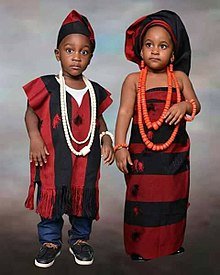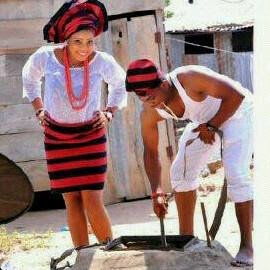Happy marriages begin when we marry the ones we love, and they blossom when we love the ones we marry – Tom Mullen
The act of marriage does not just describe the coming together of two people to become one. Normally, it is an act considered to be one of the biggest event in one's life.
In line with that, ór' ònya, which means traditional marriage in English language is one of the highly esteemed socio-cultural events in Orokam, a district of Ogbadibo local government area of Benue state, which is one of the Northern states in Nigeria.
It is a unique local community which shares boundary with Kogi state in the West and in the Souty, Enugu. Her people are culturally inclined & sociable. They like to meet & spend time with people in a friendly way. They are bound by the philosophical "Aroji",a ligature which clearly distinguishes them from others.
It is mandatory for the traditional marriage to be done before the church wedding can take place. However, after the tradition marriage, if the couple can't afford a church wedding, that does not restrict them from being seen as married.
It should be noted that this tradition has been around for a very long time (as far back as during the time of our forefathers) and although the world keeps evolving featuring some traditions being erased as a result of civilization, this tradition has been relatively untouched by the modern world.
THE PRELIMINARY MOVE
There are three stages here. After the groom has sought the consent of his parents, the young man, accompanied by his father & a very few close associates would visit her family members with wine (eje), Kola nuts (énmè), and other gift items, according to how bouyant he is.
The father of the prospective groom metaphorically informs the host that he has discovered a ripe fruit (ikpóchi) within, and has come to seek the owner. This stage is known as Enme oce tabo.
The next stage is known as Ikpe Oode, which would take place after the first formal visitation. It features the bride being asked if she is interested in her suitor. The suitor would again come with his people, and also drinks.
If she accepts his proposal, the date for their traditional marriage would be fixed.
As this is going on, some neighbours who are curious , in the bid to satisfy their curiousity would come to the house and give flimsy excuses for doing so. In line with that, it is very common too to see one or two neighbours who usually say; "I called to greet. I was just passing by". These people constitute grapevine (itete-frete/awanda).
THE MAIN CEREMONY (ÓR' ÒNYA)
The main day is preceded by the marriage eve. This is where the crunch is. A gathering of the wise men from both families including the mediator (ogbóbu) who must be well-known and accepted by both families due to the critical role he plays in the entire contract.
The dowry and other charges are negotiated and decided mainly by a sub group of wise men called "Ai-juju", made up of members who are grounded in marriage matters.
The main day is merely a day of merriment. One of the intrigues is the coming out of the bride, accompanied by her 'Anchanya' (bridal train). An opportunity for them to flaunt their 'gifts', amidst cheers and radiant smiles from the audience, especially the young men who would've positioned themselves for the swags and a possible catch.
The bride would be given a calabash or cup, depending on the one prefered, to give her husband palm wine (which would have already been poured inside before she is given). She is to serve him while on her kneels.

Source
THE COSTUME OF THE COUPLE
Note that the costume of the couple would be red and black attire (or an extra colour such as white). The bride would wear a red and black attire, with beads on her neck, and she could hold a bag. The groom could either tie only a wrapper or use a black singlet with it. Sometimes, the groom would wear a native dress and put put the black and red wrapper on his neck like a muffler.
During the traditional marriage, the family of the groom would give the bride a rooster and some money. This is very significant. If she accepts it, it is a sign that she approves of the marriage and is interested in it. If she rejects it, it is a sign that she does not approve of the marriage.
The event reaches a crescendo in a dance by the couple, after which their friends would also join. It is definitely fun all the way. Note that it could last for as long as two days, depending on the couple.
Reference
Orakam

Hello! I find your post valuable for the wafrica community! Thanks for the great post! We encourage and support quality contents and projects from the West African region.
Do you have a suggestion, concern or want to appear as a guest author on WAfrica, join our discord server and discuss with a member of our curation team.
Don't forget to join us every Sunday by 20:30GMT for our Sunday WAFRO party on our discord channel. Thank you.
Thanks for using the girlsfoundation tag as one of your tags. Don't forget to follow @girlsfoundation.
you can also support the girlsfoundation by following our curation trail using steemauto
Congratulations @ogine! You have completed the following achievement on the Steem blockchain and have been rewarded with new badge(s) :
Click on the badge to view your Board of Honor.
If you no longer want to receive notifications, reply to this comment with the word
STOPDo not miss the last post from @steemitboard: